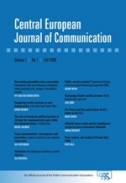Recreating journalism after censorship. Generational shifts and professional ambiguities among journalists after changes in the political systems
Recreating journalism after censorship. Generational shifts and professional ambiguities among journalists after changes in the political systems
Author(s): Epp Lauk, Svennik HoyerSubject(s): Politics / Political Sciences
Published by: Wydawnictwo Uniwersytetu Wrocławskiego
Keywords: press history; comparative approach; press freedom; censorship; Norway; Estonia; Soviet press system; transition
Summary/Abstract: The system and practices of both German censorship in Norway in 1940–1945 and of Soviet censorship in Estonia in 1944–1990 were, because of their totalitarian nature, very similar. Some aspects of the reorganisation of the press in Norway and Estonia aft er the shift to freedom of expression are compared. In both countries freedom of the press released a high level of activity in publishing, attracting a lot of new and untrained journalists to the fi eld. Th is created a generational shift , if not a cleavage, between old hands and neophytes. Since the younger generation was more numerous, the transition also implied tensions and ambiguities between diff erent ideas of professional practices and values. When media began to consolidate in both countries, the job market became more competitive and journalists found themselves under commercial pressures and, somewhat paradoxically, in the same process became more professionalized. In Norway the old multi-party press re-emerged aft er a short while together with old routines from the mid-war period. In Estonia, the old Soviet press system was replaced with completely diff erent one, based on private ownership and ruled by the free market.
Journal: Central European Journal of Communication
- Issue Year: 1/2008
- Issue No: 01
- Page Range: 5-22
- Page Count: 18
- Language: English

